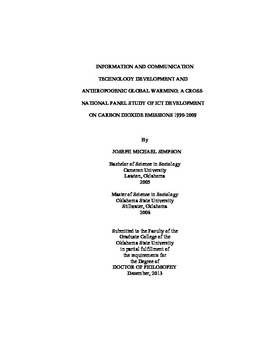| dc.contributor.advisor | Fullerton, Andrew | |
| dc.contributor.author | Simpson, Joseph Michael | |
| dc.date.accessioned | 2015-06-17T20:08:03Z | |
| dc.date.available | 2015-06-17T20:08:03Z | |
| dc.date.issued | 2013-12 | |
| dc.identifier.uri | https://hdl.handle.net/11244/15124 | |
| dc.description.abstract | Policy makers and ecological modernization scholars have begun to focus attention on the application of information and communications technologies (ICTs) to the mitigation of CO2 emissions, the primary cause of anthropogenic global warming. This begs the question. Does ICT development increase or decrease CO2 emissions? Two schools of thought provide competing hypotheses on this question. On one hand, Ecological Modernization Theory and its associated perspectives offer an optimistic appraisal of the impact of ICT development on CO2 emissions. On the other hand, World Systems Theory, Treadmill of Production Theory and Structural Human Ecology Theory offer a pessimistic view of the potential for ICT development to reduce CO2 emissions. This dissertation investigates the impact of ICT development on CO2 emissions and resolves which school of thought is most appropriate. The analyses of six dependent variables (total CO2 emissions, per capita CO2 emissions and CO2 emissions from electricity, buildings, manufacturing, and transportation) are conducted using a multilevel growth model that examines both changes over time (level-1) and differences between countries (level-2). The analyses cover the years 1990-2009 and uses three samples of nations: a global sample of all countries that data are available for (N=1926, n=121), a developed countries sample (N=461, n=26) and a less-developed countries sample (N=1465, n=95). Four key ICT development indicators are included as independent variables: fixed telephones per 100 people, mobile telephones per 100 people, the leapfrogging ratio of mobile telephones to fixed telephones and Internet users per 100 people. Population size, GDP per capita, urbanization, trade, and service economy are included as controls. The results of the analyses support the pessimistic view of ICT development. Fixed telephones per 100 people is the most consistent driver of increased CO2 emissions globally. Mobile telephones do not have a significant impact on CO2 emissions. Globally, the Internet does not have a significant effect on CO2 emissions; however, in developed countries the Internet does increase CO2 emissions. | |
| dc.format | application/pdf | |
| dc.language | en_US | |
| dc.rights | Copyright is held by the author who has granted the Oklahoma State University Library the non-exclusive right to share this material in its institutional repository. Contact Digital Library Services at lib-dls@okstate.edu or 405-744-9161 for the permission policy on the use, reproduction or distribution of this material. | |
| dc.title | Information and communication technology development and anthropogenic global warming: A cross-national panel study of ICT development on carbon dioxide emissions 1990-2009 | |
| dc.contributor.committeeMember | Dunlap, Riley E. | |
| dc.contributor.committeeMember | Knottnerus, J. David | |
| dc.contributor.committeeMember | Caniglia, Beth Schaefer | |
| dc.contributor.committeeMember | Vadjunec, Jacqueline M. | |
| osu.filename | Simpson_okstate_0664D_13133.pdf | |
| osu.accesstype | Open Access | |
| dc.type.genre | Dissertation | |
| dc.type.material | Text | |
| dc.subject.keywords | anthropogenic global warming | |
| dc.subject.keywords | carbon dioxide | |
| dc.subject.keywords | development | |
| dc.subject.keywords | environmental sociology | |
| dc.subject.keywords | hierarchical growth models | |
| dc.subject.keywords | information and communication technology | |
| thesis.degree.discipline | Sociology | |
| thesis.degree.grantor | Oklahoma State University | |
